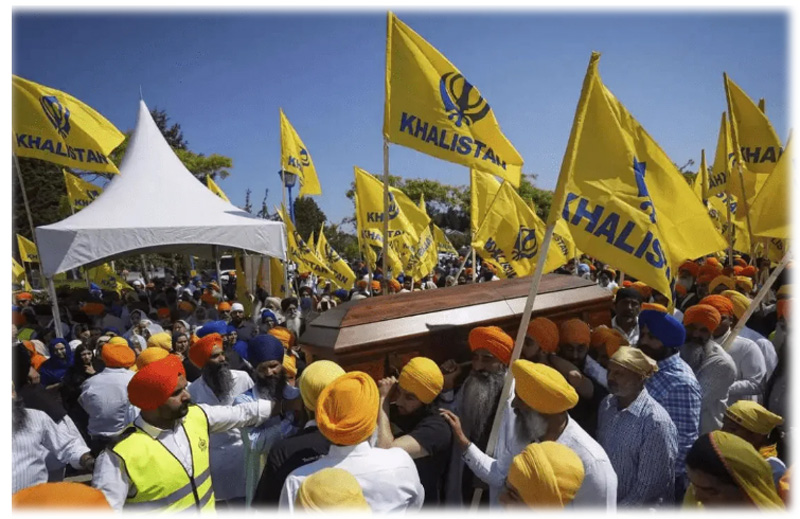Khalistan in the West: Unmasking the global terror support network

In the shadows of a peaceful Sikh diaspora, a handful of Khalistan extremists continue to operate, fueled by foreign support and harbouring personal ambitions, without any regard for collateral damage. While the Khalistan movement claims to advocate for the Sikh community, it offers nothing but a utopian mirage, completely divorced from the realities of modern-day Punjab.
The Khalistan movement, which seeks to create a separate theocratic Sikh state, has no takers in Punjab, India. However, the separatist movement’s supporters continue to operate, particularly in Canada the United States, and the United Kingdom, raising funds and lobbying their respective governments against India.
There is ample evidence of this support. The Diplomat has documented Pakistan’s role in providing refuge, training, and arms to Khalistani terrorist organizations, while foreign affairs analyst Christine Fair has highlighted the importance of the diaspora in enabling this support.
Also, Terry Milewski in his book ‘Blood for Blood‘, reveals Pakistan’s pivotal role in supporting the Khalistan movement since its inception, underscoring the historical depth of this association.
These Khalistan supporters have also been active in using American, Canadian, and British soil to raise funds for Khalistan terror groups, often using informal hawala networks. This is evident in the case of Balwinder Singh, a US resident who was convicted in 2017 of providing material support to Khalistani terrorist groups in India and sentenced to 15 years in federal prison.
“The JTTF investigation led to the discovery of a Reno resident who was a member of two terrorist groups and provided material support to intimidate the Indian government and to harm persons that were not supporting the terrorism groups’ cause,” said U.S. Attorney Bogden. “This case is an example of multi-law enforcement agencies working collaboratively together to protect the United States and our foreign allies from a terrorist act.”
Another example is the undercover USCS sting operation of Bhajan Singh Bhinder, a Khalistan activist in California, who attempted to purchase military-grade weapons for Khalistan groups committing terror attacks in India.
More recently, the organization Sikhs for Justice (SFJ) has emerged as the most prominent pro-Khalistan group in the West. While claiming to advocate peacefully for a referendum on Khalistan, SFJ has openly associated with convicted Khalistan terrorists and those suspected of being involved in large-scale terror plots in India.
Recent threats of blowing up an Air India flight on November 19th by self-proclaimed Khalistan extremist Gurpatwant Singh Pannun, the General Secretary of Sikhs for Justice, serves as a stark reminder of a separatist movement that does little but promote terrorism, incite violence, and division. Pannun has now gone a step further, openly calling for an attack on the Indian parliament on December 13th.
The organization also has close links to Paramjit Singh Pamma, a BKI fundraiser wanted by Indian authorities for his material support of terrorism. Pannun himself has been accused of receiving terrorist training in Pakistan and was sentenced to 30 months in prison for his involvement with BKI.
The world will never forget the horrors of 9/11 and 26/11. These attacks were acts of pure evil, and we must never let them fade from our memory. We must also remember that the fight against terrorism is not over. These extremist groups continue to operate, and they are committed to causing as much harm as possible. We cannot allow them to pursue their agenda under the cover of free speech. We must stand together and say no to extremism in all its forms.
(Photo and text courtesy: Khalsavox.com)




